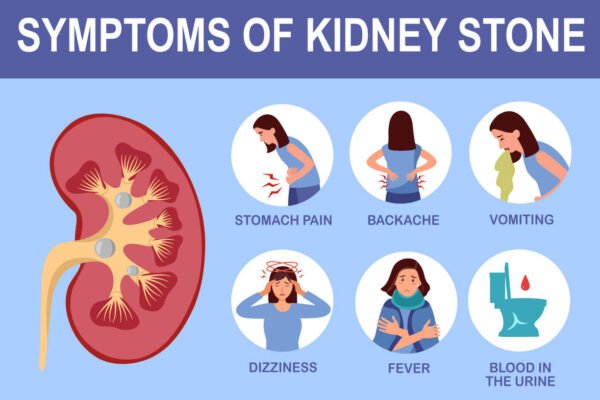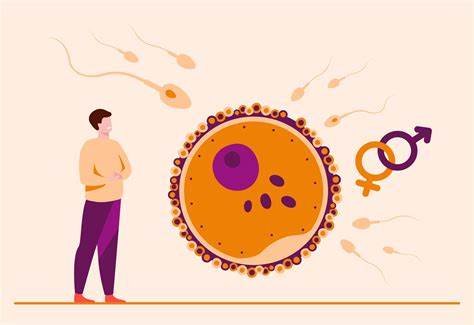
The Impact of Stress from Gambling on Male Fertility
Gambling is often seen as harmless entertainment, especially with online platforms offering attractive incentives like…

Gambling is often seen as harmless entertainment, especially with online platforms offering attractive incentives like cashback casino bonuses. However, for some men, gambling can evolve into a high-pressure activity that generates deep psychological stress. What’s less known is how this stress can take a toll on male fertility. From hormone imbalances to unhealthy habits, the…

Kidney stones are hard deposits that form in your kidneys. They can be very painful and cause a lot of discomfort. Knowing the symptoms of kidney stones can help you identify the problem early. Early detection can lead to better treatment and less pain. In this article, we’ll go over the common signs and symptoms…
Male infertility can be caused by various factors, such as hormonal imbalances, physical blockages, or issues with sperm quality. If you’re experiencing difficulty conceiving, it’s important to understand the tests and procedures that can help diagnose the underlying causes of male infertility. A thorough evaluation by a urologist or fertility specialist can identify the issue…

Hormones play a vital role in regulating male fertility by influencing the production of sperm and the overall health of the reproductive system. These chemical messengers are responsible for ensuring the proper function of the testes, regulating sperm production, and maintaining sexual function. A disruption in hormonal balance can lead to fertility issues and difficulty…

Male infertility is often subtle, with many men not noticing any obvious symptoms. However, certain signs and symptoms can indicate underlying fertility issues. Understanding these signs is crucial for identifying infertility early and seeking the appropriate treatment. 1. Difficulty Conceiving The most common and significant sign of male infertility is the inability to conceive after…

Male infertility is a common issue affecting many couples trying to conceive. It accounts for approximately 30-40% of infertility cases. Understanding the causes and diagnosis of male infertility is essential for identifying the right treatment and improving the chances of conception. What is Male Infertility? Male infertility refers to the inability to conceive a child…

Male fertility is influenced by various lifestyle factors, and understanding how these choices impact reproductive health is crucial for those trying to conceive. Diet, exercise, stress, and exposure to harmful substances can all affect sperm quality, quantity, and overall fertility. Here’s how lifestyle choices play a role and what you can do to improve your…

Male infertility affects many couples trying to conceive, but advances in medical science offer a range of effective treatments. From medications to surgical procedures, each approach targets specific underlying causes, improving the chances of successful conception. Here’s a detailed look at the options available for treating male infertility. Medication Treatments Hormonal therapy corrects hormonal imbalances…

Diet and nutrition play a vital role in male fertility, influencing sperm production, motility, and overall reproductive health. The quality of nutrients consumed directly affects hormone levels, oxidative stress, and the functionality of reproductive organs. Understanding the connection between food and fertility can help men adopt a diet that supports their reproductive goals. Key Nutrients…

Male fertility can be significantly influenced by stress and mental health. Emotional well-being plays a critical role in overall reproductive health, as chronic stress and mental health conditions can affect hormonal balance, sperm quality, and sexual performance. Here’s a deeper look into how stress and mental health impact male fertility and what can be done…
Ever been sidelined by something as small as a kidney stone? Or surprised to learn how closely your bladder health connects to your overall wellness? Urology focuses on small but vital organs that have a major impact on your health. At the Urology Conference, we turn complex medical ideas into easy-to-understand information. Whether it's urinary tract infections or male reproductive health, our goal is to make the science simple and highlight the innovations shaping the future of urology.
Whether you're a healthcare worker, medical researcher, student, or just looking for answers — you've come to the right place. Let's dive into the important world of urology together.
Urology is the branch of medicine that deals with the urinary system and the male reproductive organs. It involves the care and treatment of the kidneys, bladder, ureters, and urethra, as well as the prostate and testicles in men. Although these organs are small, they play huge roles in your body's overall health.
Your urinary system removes waste and extra fluids from your blood, keeping your body clean and balanced. When this system is healthy, you feel good. But when something goes wrong — like infections, stones, or cancers — it can disrupt your daily life.
In addition, urology addresses men's health issues like prostate conditions and infertility. These topics can be sensitive but are critical for well-being. By understanding urology, you gain tools to take better care of yourself and your loved ones.
You might be surprised to learn how many people experience urological problems at some point. Here are some of the most frequently encountered urological conditions:
Kidney stones are solid clumps that develop in the kidneys when minerals and salts build up and stick together over time. They can cause intense pain when they move through your urinary tract. Luckily, with early detection and treatment, most people recover fully.
Urinary tract infections (UTIs) occur when bacteria invade the urinary system, leading to irritation and swelling. While they're more common in women, anyone can experience them. Symptoms often include burning during urination and frequent urges to go. UTIs usually respond well to antibiotics.
Benign Prostatic Hyperplasia (BPH) refers to the non-cancerous growth of the prostate gland, a condition frequently seen in aging men. It can cause difficulty urinating and increase the need to go at night. Treatments range from lifestyle changes to medications and, in some cases, surgery.
Problems like overactive bladder or bladder infections can affect anyone. These conditions may cause frequent urination, leakage, or discomfort. Proper diagnosis and management improve quality of life.
Male infertility can arise from various causes such as hormonal imbalances or physical blockages. Urology helps diagnose and treat these conditions to support couples trying to conceive.
Prostate cancer ranks among the most frequently diagnosed cancers in men. Early screening and advances in treatment have improved survival rates significantly. Staying informed and seeking regular checkups is important.
Urology is a rapidly evolving field, with new technologies constantly improving patient care. This mirrors trends in other sectors, where digital innovation is also rapid. For example, the online entertainment industry sees the frequent launch of new casinos and regionally specific platforms, including many new online casinos Australia. Here are some exciting trends in our field:
Techniques like laparoscopic and robotic surgery allow doctors to perform complex operations through tiny incisions. This results in less pain, shorter hospital stays, and faster recovery.
Especially since the COVID-19 pandemic, telemedicine has become a convenient way for patients to consult urologists remotely. This improves access to care, especially for people in rural areas.
Using genetic testing and other tools, doctors can now tailor treatments based on a patient's unique biology.
New imaging techniques and biomarkers help detect urological conditions earlier and more accurately. Early diagnosis is key to successful treatment.
AI is helping analyze medical data to predict disease risk, plan surgeries, and improve patient outcomes. This technology is still emerging but shows great promise.
What you eat directly affects your urinary system's function. Some foods and drinks support the health of your kidneys and bladder, while others can cause irritation or increase the risk of developing kidney stones. For example, diets rich in fruits and vegetables provide antioxidants and hydration, which support kidney function and reduce inflammation. Conversely, excessive salt, processed foods, and sugary drinks can increase the risk of kidney stones and hypertension, which impacts kidney health. At Urology Conference, we provide practical nutrition advice to help you make informed dietary choices that promote lifelong urinary wellness.
Urological health isn't only an adult concern; children often face unique urinary challenges too. Pediatric urology deals with conditions such as congenital abnormalities, bedwetting (nocturnal enuresis), and urinary tract infections in young patients. Early diagnosis and treatment can prevent complications later in life. For parents and caregivers, understanding the basics of children's urological health can bring peace of mind and empower you to seek timely care. Our resources include child-friendly explanations and tips on managing common pediatric urology issues with compassion and clarity.
Living with a urological condition can take an emotional toll, yet mental health is often overlooked in this context. Anxiety, depression, and social embarrassment related to conditions like incontinence or prostate cancer can deeply affect the quality of life. Urology Conference champions holistic health by addressing both the physical and psychological aspects of urological diseases. We offer resources on coping strategies, support groups, and advice on communicating openly with healthcare providers to ensure mental well-being is part of your healing journey.
Seeing a urologist for the first time can be intimidating or overwhelming. Knowing what to expect helps reduce anxiety and ensures you get the most out of your appointment. Typically, your doctor will ask about your symptoms, medical history, and lifestyle habits. Physical exams and diagnostic tests may follow. We recommend writing down your symptoms, questions, and any medications you take before your visit. At Urology Conference, we provide checklists and tips to guide you through every step of your healthcare journey.
Your daily habits play a huge role in keeping your urinary system functioning well. Smoking, for example, is a major risk factor for bladder cancer and can worsen other urological conditions. Lifestyle habits and leisure preferences can also vary culturally. For instance, in Australia, online entertainment is very popular, with platforms like the casinoroo online casino and games known as ace pokies being common choices for recreation. Lack of physical activity and obesity also increase the risk of urinary incontinence and kidney disease. On the other hand, maintaining a healthy weight, exercising regularly, and avoiding harmful substances contribute positively to urinary health. At Urology Conference, we emphasize practical lifestyle changes that empower you to protect your urinary system every day.
Recent developments in pediatric urology have greatly improved outcomes for children with urinary tract issues. Minimally invasive surgeries, tailored medication plans, and new diagnostic tools make treatment less stressful and more effective for young patients. Early intervention is key to preventing long-term complications, such as kidney damage or bladder dysfunction. Our platform keeps parents and healthcare professionals updated on the latest research and treatment methods designed specifically for children's unique needs.
Urological cancers, including bladder, kidney, and prostate cancer, can be life-changing diagnoses. However, catching these cancers early dramatically improves treatment success. Recognizing symptoms like blood in the urine, persistent pain, or changes in urination habits is crucial. Prevention strategies also matter—avoiding tobacco, staying hydrated, and having regular screenings when recommended can lower risk. Urology Conference provides clear guidance on spotting warning signs early and taking proactive steps to protect yourself.
Patient advocacy means understanding your rights, asking questions, and actively participating in your care decisions. Being your advocate leads to better outcomes and greater satisfaction with treatment. At Urology Conference, we encourage patients to speak up, seek second opinions, and use available resources. Empowerment through knowledge is at the heart of what we offer, helping you take control of your urological health journey.
Drinking enough water helps your kidneys filter waste efficiently and prevents the formation of kidney stones. When you don't drink enough fluids, urine becomes concentrated, increasing the risk of infections and stone development. At Urology Conference, we provide practical tips on how to stay hydrated throughout the day, signs of dehydration to watch for, and how hydration needs can change with age and health conditions.
Did you know that chronic stress can worsen urological symptoms? Stress triggers the release of hormones that affect bladder function and can increase urgency or frequency of urination. Managing stress through mindfulness, exercise, and healthy coping mechanisms can lead to noticeable improvements. For some, this means engaging in hobbies or leisure activities that provide a mental escape, from classic card games like the baccarat game online to exploring themed digital environments like La Riviera Online Casino. At Urology Conference, we emphasize the mind-body connection and offer resources to help you reduce stress for better urinary health.
Erectile dysfunction (ED) is a frequent concern for men, becoming more prevalent with age. Often, ED is linked to underlying urological or vascular conditions, such as prostate problems, diabetes, or hypertension. Addressing ED involves more than just managing symptoms; it requires a holistic approach to your overall health. Our content covers the causes, treatments, and lifestyle adjustments that can help men regain confidence and improve sexual health in a supportive, stigma-free environment.
Regular preventive screenings are vital in catching urological problems early before they become serious. Screenings like prostate-specific antigen (PSA) tests, ultrasound imaging, and urine analysis can identify conditions such as prostate cancer, kidney disease, or infections early on. Early detection leads to easier treatment and better outcomes. At the Urology Conference, we emphasize the importance of scheduling routine checkups and understanding which tests are appropriate for your age and risk factors.
Getting older often brings natural changes to the urinary system that may impact how it works. Seniors may experience increased urgency, bladder weakness, or prostate enlargement. These changes are common but not something you have to simply accept. With proper medical care, lifestyle adjustments, and sometimes medication, older adults can maintain urinary health and comfort. Our resources cater specifically to seniors and caregivers, offering guidance to navigate these changes with dignity and confidence.
Urinary incontinence, which is the accidental release of urine, is more widespread than people think and affects individuals of all genders. Causes vary widely and include muscle weakness, nerve damage, infections, or prostate issues. Fortunately, many treatment options exist, from pelvic floor exercises and medications to surgical procedures. At Urology Conference, we provide straightforward explanations and practical advice to help those affected regain control and improve their quality of life.
For individuals with chronic kidney disease (CKD), managing fluid intake is a delicate balance. Monitoring hydration carefully, often with guidance from a healthcare provider, is key to slowing disease progression. Our content includes tips on recognizing hydration needs, working with medical teams, and adapting lifestyle habits for optimal kidney health.
Weakness or dysfunction in these muscles can lead to problems like urinary incontinence, pelvic pain, and even sexual dysfunction. Pelvic floor therapy, including targeted exercises and biofeedback, can greatly improve these conditions. At Urology Conference, we provide guidance on recognizing pelvic floor issues and highlight effective treatments to strengthen this vital area for both men and women.
Certain urological conditions require urgent medical attention to prevent serious complications. Examples include sudden inability to urinate, severe pain from kidney stones, or blood in the urine accompanied by dizziness or fever. Knowing when to seek emergency care can make a life-saving difference. We educate visitors on warning signs, first steps to take, and how to communicate effectively with healthcare providers during urological emergencies.
Genetics can influence the risk of developing various urological conditions, such as kidney disease, bladder cancer, and certain prostate disorders. Urology Conference covers the latest insights into genetic testing and how it's shaping the future of personalized urological care.
Alongside conventional medical treatments, complementary therapies like acupuncture, herbal medicine, and stress reduction techniques can support urological health and improve symptoms. For example, some patients find relief from chronic pelvic pain or urinary urgency through these approaches. We explore the evidence behind various complementary therapies, helping you make informed decisions about integrating them safely with your existing treatment plan.
No matter your background, Urology Conference offers valuable insights. The digital age provides access to specialized information on nearly any topic of interest. For example, for information on entertainment options available in New Zealand, you can Access here.
At Urology Conference, we aim to be more than just a website. We want to be your partner in health. Here are some ways we support you:
We publish well-researched, easy-to-read articles on a wide range of topics, from kidney stones to prostate health.
Hear from leading urologists and researchers about the latest advances and practical tips.
Real stories from people who have faced urological challenges offer hope and understanding.
We host live events and recordings featuring experts discussing current topics.
Need a quick answer? Check our FAQs or explore our glossary of medical terms explained in plain English.
Prevention is often the best medicine. Here are simple steps everyone can take to keep their urinary system healthy:
If you need medical care, knowing what to expect can ease anxiety. Common tests include:
Your urologist will explain the purpose and process of each test. We provide detailed guides here to help you prepare.
Urology Conference is more than information — it's a community. Connect with others through our forums, social media, and events. Share your questions, experiences, and support.
Your urinary health matters. At Urology Conference, we are committed to helping you understand, manage, and improve this essential part of your well-being. With clear information, expert insights, and a supportive community, you can face urological challenges with confidence.
Thank you for visiting. Explore our site, learn at your own pace, and don't hesitate to connect. Together, we can make the complex simple and take charge of our health.